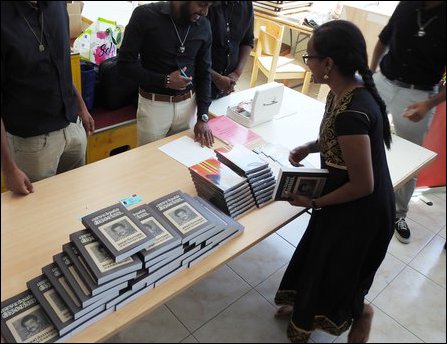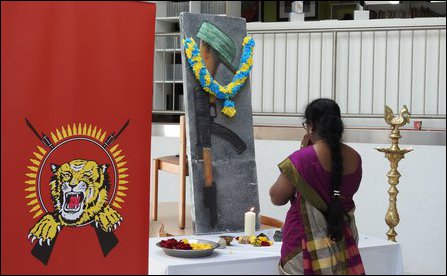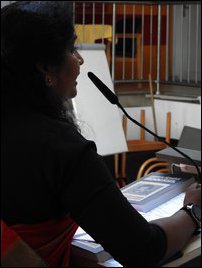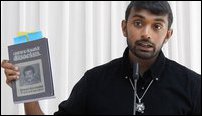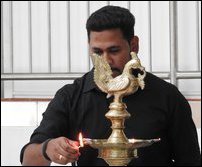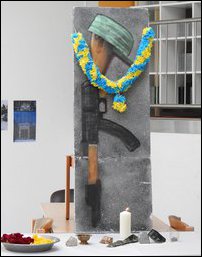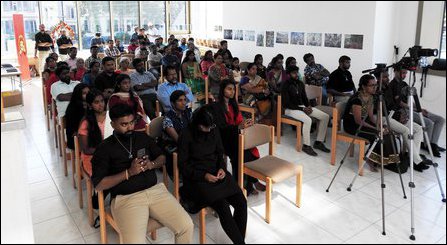Pirapaharan’s statements between 1984 and 1993 reproduced in book form in Europe
[TamilNet, Monday, 05 August 2019, 23:55 GMT]
A Switzerland-based Eezham Tamil youth group, ‘Phoenix - the Next Generation’, has photostatically reproduced the rare 314-page compilation officially published by the Headquarters of the Liberation Tigers of Tamil Eelam (LTTE) in September 1993 in Jaffna. The book contains selected letters, interviews and statements of LTTE Leader Velupillai Pirapaharan starting from his first media interview in March 1984. The compilation consists, amongst others, of a letter that declines LTTE representation at a meeting held in New York in May 1985, appeals to the leaders of India and Tamil Nadu during the LTTE-IPKF war in 1987, and a letter of solidarity addressed to South African (ANC) leader, the late Oliver Tambo, in July 1988. The reproduction has been made from a book obtained at the public library of Jaffna in the past. The book, with ID 9907, is no longer accessible at the library.
The compilation is titled Eṉatu Makkaḷiṉ Viṭutalaikkāka (எனது மக்களின் விடுதலைக்காக, For the Liberation of My People).
Nitharsan, the coordinator of Puradsi Media of the youth group, led the launch event in Bern on Sunday, where the first copy of the publication was dedicated to those who sacrificed their lives for Tamil Eelam.
The event also featured a speech by a former LTTE member, who had closely witnessed the cultural and upbringing projects of the LTTE in the two decades that followed the period covered by the book in the de-facto state of Tamil Eelam.
The former LTTE member appreciated the publication work being carried out by the youth group. Only by knowing the contemporary politics and the struggle of the preceding decades the future generations could evolve the future discourse, the ex-LTTE member said.
The book also reflects the significance of political renditions in Tamil by the late Anton Balasingham before, during and immediately after the Indian intervention.
Nitharshan, in his speech, said that the book was a prime source enlightening the readers how the LTTE leader evolved a genuinely independent movement without getting into the agenda of any outside power seeking to influence or exploit the armed liberation movement of Eezham Tamils.
“We [the Tamil diaspora youth] should not allow us to get waylaid by the talk of unitary and federal forms of the constitution in the island. As far as we are concerned, our source of inspiration should always be the de-facto state of Tamil Eelam that existed before the SL State waged the genocidal onslaught in 2009 with the backing of all the outside powers.”
He observed how the British allowed the Sinhala nationalist leaders in the South to evolve the unitary state system in Ceylon into unitary and genocidal Sri Lanka in the post-Second World War context. Furthermore, the Cold War era had emboldened the unitary state system, which under the rule of JR Jayawardene introduced the executive presidential system following the US model in 1978.
The USA was toeing the same geopolitical line of the British, giving significance to Trincomalee-oriented naval access in the [then the overwhelmingly Tamil] East and air access in the West [of the Sinhala South].
It was in 1996, after the period covered in the book up to 1993, the elite US ‘Green Beret’ corps provided training to the SL military, he recalled.
However, the LTTE-led armed struggle continued achieving military and diplomatic parity of status in 2001.
During the peace process, the powers openly recognised that it was not possible to militarily defeat the LTTE. However, they contributed significantly to the ‘One State One Military in the island’ paradigm by tilting the power of balance and allowing the SL State to complete the genocidal onslaught, he said.
Following is an English translation of the contents featured in the book, as provided by the Puradsi Media:
| 1 | Foreword I – IV | |
| 2 | History is my guide | 1 |
| 3 | State oppression & armed resistance | 13 |
| 4 | The national force of Tamil Eelam: Leader Prabhakaran’s letter | 21 |
| 5 | Ceasefire & peace talks | 25 |
| 6 | Why did the Thimbu Talks end in failure? | 31 |
| 7 | A liberated sovereign Tamil Eelam state is our struggle’s goal | 35 |
| 8 | The Sinhalese government prefers a military solution | 41 |
| 9 | Traitors are more dangerous than enemies | 51 |
| 10 | Why was the organisation of the Liberation Tigers formed? | 55 |
| 11 | Struggling for freedom is our historic duty | 65 |
| 12 | The interference of the Indian military in Tamil Eelam is unnecessary | 73 |
| 13 | My life’s background, goals and priciples | 77 |
| 14 | The Tamil homeland is the foundation of our nationalism | 95 |
| 15 | Hunger strike unto death: the national leader’s explanation | 101 |
| 16 | The Tamil Nadu government bends to the national leader’s demands | 103 |
| 17 | Webs spun to destruct the tamil nation | 105 |
| 18 | Ahimsa ideology & the armed struggle | 111 |
| 19 | Prosperity of the proletariat | 119 |
| 20 | The historically significant Suthumalai Declaration | 123 |
| 21 | The Indian government is upholding its national interests | 127 |
| 22 | Thiyagi Thileepan is an idealistic flame | 133 |
| 23 | Arresting commanders contradicts the agreement | 137 |
| 24 | The unforgivable crime committed against our people | 139 |
| 25 | The war given by India: a letter to M.G.R. from the national leader | 143 |
| 26 | Letters written by the national leader to India’s Prime Minister, Rajiv Gandhi | 149 |
| 27 | The Indian military’s atrocities: a letter to the U.N. by the national leader | 155 |
| 28 | Indo – LTTE war: the national leader’s explanation | 161 |
| 29 | Send the UNHRC to Tamil Eelam | 169 |
| 30 | The national leader’s 3rd letter to Rajiv Gandhi | 173 |
| 31 | The national leader’s declaration to the World Tamil Conference | 177 |
| 32 | The national leader’s request to the African & United Nations | 181 |
| 33 | The oppressed will eventually succeed | 185 |
| 34 | The UN must attempt to expel the Indian forces | 189 |
| 35 | The national leader’s request to a conference held by Non-Aligned Movement | 193 |
| 36 | The most significant historic mistake committed by the Indian government | 197 |
| 37 | A dark chapter in our liberation struggle | 201 |
| 38 | Our excessive self-confidence is our strength and weakness | 207 |
| 39 | Annai Poopathi’s sacrifice is unmatched in global history | 213 |
| 40 | The event which gave us the spiritual strength to resist the Indian superpower | 215 |
| 41 | Our history is written by our martyrs’ blood | 217 |
| 42 | The women have risen as a revolutionary force | 219 |
| 43 | A self – sufficient economy is the foundation of a separate state | 223 |
| 44 | Revolutionary creations are necessary to cultivate the liberation struggle | 225 |
| 45 | All of the people who contributed to the revolutionary struggle are māmaṉitar | 229 |
| 46 | A war cannot be conducted if there is a fear for losses | 233 |
| 47 | The path to a political solution: The national leader’s explanation | 239 |
| 48 | Sencholai children’s home: the national leader’s congratulatory remarks | 245 |
| 49 | May it sound as the war drums for a war of truth | 247 |
| 50 | For those yearning for heroic liberation, determination is the strongest weapon | 249 |
| 51 | What is the liberation of the women? The national leader’s explanation | 253 |
| 52 | Dharma will prevail in a war of truth | 257 |
| 53 | People are facing the torrents of oppression like a mountain | 261 |
| 54 | Our arts and culture are the soul of our nation | 265 |
| 55 | Politics is the service provided to suffering people | 269 |
| 56 | I have a dream which must become a reality | 273 |
| 57 | The martyrs who stand as the pillars of our liberation organisation | 275 |
| 58 | Honesty, virtue and discipline are essential for the implementation of justice | 281 |
| 59 | The struggle is the shield of education; education is the struggle’s fort | 285 |
| 60 | Kittu is an individual legacy: a stunning idealist | 289 |
| 61 | What is the path to a peaceful solution? Thalaivar’s explanation to BBC | 293 |
| 62 | Women’s liberation struggle: The LTTE’s spark | 301 |
| 63 | When life is incomplete, knowledge is essential | 305 |
| 64 | Iron men in their goals: the national leader’s dedication for the Black Tigers | 307 |
| 65 | The poet who renewed wartime literature | 311 |
| 66 | Social justice must blossom upon the basis of truth | 313 |
Chronology:







